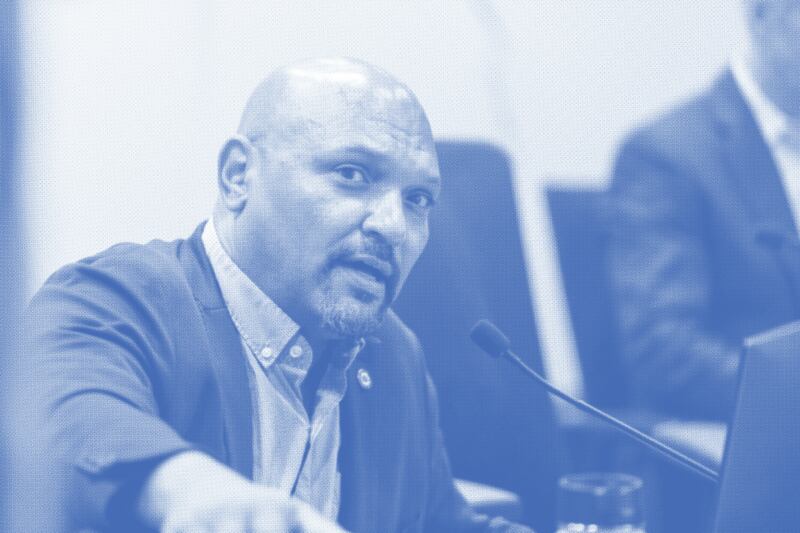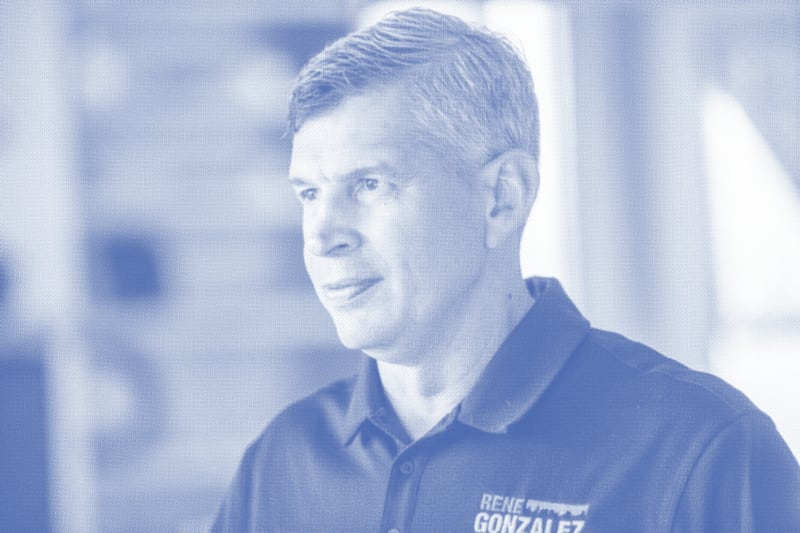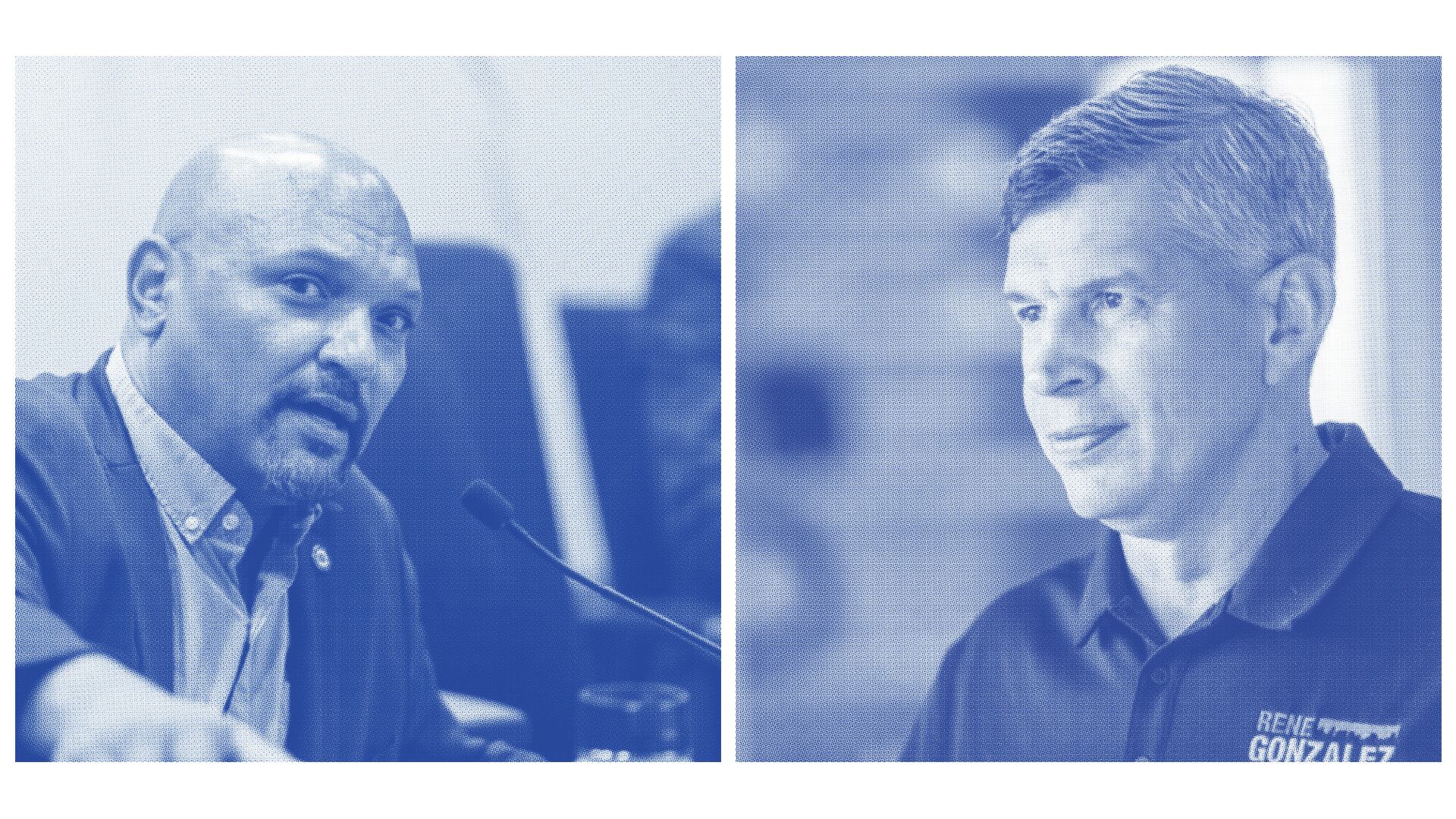Portlanders who think the city has lurched too far to the left, take solace: The two leading declared candidates running for mayor agree with that assessment.
It’s not until next November that voters will decide on the next mayor of Portland, but City Commissioners Mingus Mapps and Rene Gonzalez have already declared their candidacy and are staking their claims to steer the city toward law and order.
Both are fairly new to the council and got their seats by running to the right of incumbent commissioners; Mapps upset Chloe Eudaly in 2020, and Gonzalez unseated Jo Ann Hardesty in 2022.
Both Gonzalez and Mapps describe themselves as moderate business-friendly Democrats, and over the past year the two have voted in lockstep on some of the City Council’s highest-profile decisions, including creating large sanctioned encampments for homeless Portlanders and banning daytime camping.
So how to tell them apart? Mapps said he’s more attuned to the plight of Portlanders of color than Gonzalez, who Mapps says takes an overly “colorblind approach” to city policy. Gonzalez says he can build coalitions while Mapps is a lone-wolf academic who persuades few.
Whoever is the city’s next mayor (Commissioner Carmen Rubio is also expected to run) will oversee a professional city administrator that runs city bureaus, while a 12-person City Council will set city policy. That new government structure is the product of a 2022 charter reform measure Portland voters approved last year. Mapps opposed it and then unsuccessfully asked voters to wait for his alternative plan; Gonzalez tried to repeal some of its provisions and was rebuffed by the rest of City Council.
In other words, both men would preside over a government structure they openly dislike. Now they have a year to persuade voters that such an arrangement would work.
This week we invited each of the candidates to our office to discuss their ambitions. We asked them to reflect on their tenures at City Hall, the city’s homelessness problem, their biggest mistakes, and their plans if elected as Portland’s next leader.
Responses have been lightly edited for brevity and clarity.

MINGUS MAPPS
WW: What’s been your biggest accomplishment on City Council?
Mapps: During a crime surge, we actually were able to grow the staff at the Bureau of Emergency Communications and bring in new technology, which I think paved the way toward that bureau becoming more efficient.
We managed to increase staff and brought on several important pieces of technology. It was, frankly, a broken bureau. I think we’ve gotten it back on track.
What’s the biggest mistake you’ve made?
When I bring forward an issue in a space that I know a lot about and my colleagues don’t, I clearly haven’t done an effective enough job of educating my colleagues on the stakes of a particular issue.
Your charter reform alternative proposal died, as did a permitting proposal this fall. What would you say to an onlooker who says, “Mapps doesn’t follow through”?
I very much disagree with that. One of the first things that happened since I got on Council is that Commissioner Dan Ryan and I headed a task force charged with streamlining our permitting system. We made enormous progress there. If you look at how long it takes to get your permits to build new single-family housing in Portland, we’ve cut that by 70%. In the end, [Commissioner] Carmen Rubio and I struck a compromise to both simplify the code and to do consolidation.
The city’s Safe Rest Villages are funded mostly by COVID dollars, which will run out in a year. Current estimates show each pod costs $60,000 a year to run. Should we keep funding these pod villages?
Yes, I think this project has proven itself to be a huge success. $60,000 is a ton. Even I’m offended by that. But this is also one of the most challenging populations in the city. So given the depths of the problems the folks who live in these villages are facing, I still think it makes a lot of sense.
The city and Multnomah County are renegotiating a three-year contract for the Joint Office of Homeless Services. What do you want in that contract that isn’t currently included?
This intergovernmental agreement has to explicitly identify and spell out the services the city is buying. We need a sobering center, we need both congregate shelter, and, frankly, we need the Safe Rest Villages.
Rene Gonzalez is also running for mayor. You’ve taken similar votes. Why are you the better choice?
He tends to be more skeptical of racial equity initiatives. He’s literally said this at City Council. I think Rene’s vision is to have a very colorblind approach to city policy.
The Portland Clean Energy Fund tax has brought in $344 million in three years. Will you push for bureaus facing budget deficits to get some of that money?
In recent weeks, PCEF has looked at some unanticipated resources that have come in, and we’ve been able to figure out how PCEF can support work being done over at PBOT and the environmental resources bureau. I think we found about $7 million in the PBOT portfolio that PCEF could support.
Businesses are leaving downtown Portland. Buildings are getting foreclosed on. What’s your elevator pitch to businesses to stay here?
We are recovering from a remarkable shock, which is both COVID and the social protests from a couple of years ago. Portland is a city in transition. I think of us as exiting our awkward adolescence. The good news is, we’re actually getting together, and leadership matters. And that’s why it’s so important that we all pay attention to this next mayor’s race.

RENE GONZALEZ
WW: What’s your biggest accomplishment on the City Council?
Gonzalez: Our 911 wait time is down 20% and down 40% for non-emergency calls. That’s from when someone calls to pick-up. I led the charge to recriminalize outdoor consumption of drugs, and we heard from Gov. Tina Kotek’s [downtown Portland] task force today that they’re endorsing that movement.
And Portland Fire & Rescue has kept the lights on at a really crucial time in the city’s history. Part of that is giving them as much support and love as possible so we can keep the staff numbers up there. We haven’t had quite the turnover we’ve had in other public safety bureaus. That’s crucially important.
What’s a mistake you’ve made?
Revisiting the charter measure was unsuccessful. [The news got out about the changes] before we were prepared to deal with the political movement that comes with taking on charter reform. And obviously the charter reform proponents mobilized very quickly in a way that was frankly eye opening. I underestimated the force of that coalition and how quickly they can mobilize.
How would the city look under Mayor Gonzalez?
Drug dealers are going to go to jail, and they’re not going to get released within 24 hours. Whether you are a minor or an adult, if you are here illegally selling fentanyl or meth on our streets, you are going to face our judicial system. And then you are going to go back to where you came from.
The other part is we have to align around what a West Coast city looks like post-pandemic. What is going to inspire families to come and stay in western cities again, what’s going to inspire young people to want to start their careers here? I think in six years we’ll have that figured out.
What about the city’s future with the Joint Office?
The governance model that’s been proposed is an improvement. It has much stronger representation for the city. So I think right now I’m leaning toward supporting further renewal.
Mingus Mapps is also running for mayor. Why are you the better choice?
We’re going to need strong, decisive leadership, and I’ve demonstrated that. It almost sounds like it conflicts with the first, but I’m actually a natural collaborator. I’ve been a deal-maker my entire life.
Mapps is a fantastic public servant, but he has some of the personality traits of the mayor. They can be lone wolves at the time. He’s academic. He’s incredibly smart. He’s incredibly principled. But there are times when you have to make a decision or hold the line and rally the troops.
He is not particularly capable of garnering three votes by himself. He’s every bit charismatic enough to do it. He’s every bit intelligent enough to do it. I just don’t know that he’s ever developed the muscle.
When we asked Mapps that question, he said that you take a colorblind approach to city policy. What’s your response to that?
I wouldn’t say “colorblind.” But when we’re talking about allocation of city dollars, basing that on race in 2023 is deeply problematic and borderline unconstitutional.
What should the Joint Office be spending its money differently?
I think they should be funding Portland Street Response just flat out. The county has a lot of unspent dollars. So spend your money. The Joint Office can stabilize the funding for that program indefinitely.
You’ve spoken to County Chair Jessica Vega Pederson’s office about funding PSR. What’s the county’s resistance?
I don’t know that I’ve heard a coherent argument against it.
What do you do about high income earners leaving Portland and blaming taxes?
Gov. Kotek called today for a multiyear moratorium on new taxes. The challenge is that we still have things we have to pay for as a community. And what’s really perverse in the current structure is that Multnomah County is overtaxing you. Metro is overtaxing. The city has taken some austerity measures, including incentives for folks to sign leases downtown. So we are heading down a path where we’re going to start starving the city of resources while Metro and the County overtax you and taxpayers are still unhappy. I don’t agree with the prospect of the city putting moratoriums on itself while other partners are not taking steps in the right direction.
Would you support sending the Preschool for All and Supportive Housing Services taxes back to the ballot for a potential repeal?
Absolutely-—or at least for refinement.
